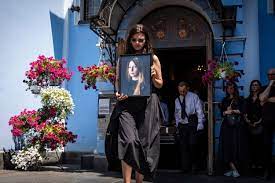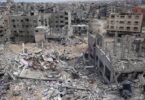Olesya Khromeychuk
‘‘I really wanted to be the founder of a literature festival in New York,” Victoria Amelina, Ukrainian writer and activist, once told a roomful of Londoners. In 2021, she did precisely that. The festival wasn’t in New York, US, but in a village with the same name in the Donetsk region, a place where her husband had spent his childhood. Sharp and witty, she syncopated her war stories with dry humour.
Her life of late was dedicated to documenting Russian war crimes. It is her death that documents the latest crime. On June 27, Victoria was in Kramatorsk, eastern Ukraine, in a pizzeria with a group of fellow writers, when a Russian missile struck the restaurant, which was full of civilians. The attack that took Victoria’s life (together with those of another 12 people, including three children), was highly praised by Colonel-General Andrei Kartapolov, the head of the Russian Duma Defence Committee. Speaking on Russian TV, he said: “The strike on Kramatorsk was a real beauty. I bow my head to those who planned it. Not a blow, but a song. My old military heart rejoices.” Victoria’s heart didn’t stop immediately. Paramedics and doctors fought for her life. Her family was nearby, her friends all over the world were pleading with all divine forces to prolong her life against all odds. She died on July 1.
“When I founded New York Literature Festival in a small village called New York in the Donbas, I was, of course, being ironic. After all, irony is what makes literature great. Self-irony made the village of New York a fantastic place. Russians have no self-irony. They are so serious about themselves. I bet they ruin our self-ironic beautiful New York with their serious Russian faces. But Ukrainians will survive, laugh and make literature festivals, not war – in all possible New Yorks. I promise,” she wrote in a tweet two weeks before her death. As New York was being shelled, Victoria travelled the globe telling international audiences about Ukrainian culture and warning of its destruction. Documenting stories of people she met in liberated territories, Victoria found a diary written by the writer and poet Volodymyr Vakulenko. He had buried it in his garden before he was kidnapped and murdered by the Russians in the first months of the full-scale invasion. His body was found in a mass burial site when the Ukrainian Armed Forces liberated the Kharkiv region.
Victoria made sure the world knew Vakulenko’s story. Posting a selfie with the diary, rolled up and tightly wrapped in a plastic bag, she wrote: “The diary of Volodymyr Vakulenko as I found it in black Ukrainian soil on Sep 24, 2022, exactly half a year after Volodymyr had hidden it before being abducted and killed by the occupiers. I keep telling myself the story of Volodymyr has nothing to do with me; but it does.” On June 22, 2023, five days before the Kramatorsk shelling, Victoria spoke at the Book Arsenal, Kyiv’s major literary festival, at the launch of Vakulenko’s diary. “Vakulenko’s memory lives,” she wrote afterwards. Victoria was about to go to Paris for a residency to write a book about the crimes to which she had borne witness. She was determined to document the murder of Ukrainian creatives, to prevent the new “Executed Renaissance” as she referred to it, harking back to the 1930s when a whole generation of Ukrainian artists and authors was murdered by the Soviet regime.
When she spoke in London back in April, she evoked a famous quote by Mikhail Bulgakov, a representative of “great Russian culture” who lived in Kyiv but was an ardent opponent of Ukrainian statehood. “Manuscripts don’t burn,” says the devil in Bulgakov’s Stalin-era novel “Master and Margarita.” “It’s Russian manuscripts that don’t burn,” Victoria remarked. “Ukrainian manuscripts burn all too well.” Many Ukrainian manuscripts have already burned in the fires caused by Russian shelling. Many more will never be written because their authors have been killed in this war. Victoria will never complete her book on war crimes. Her colleagues will have to make sure that the stories she recorded see the light of day as she did with Vakulenko’s diary. A chain of salvage that keeps Ukrainian culture alive.
“Her death was caused by injuries incompatible with life,” said the statement issued by PEN Ukraine, informing of Victoria’s death. The first time I read this phrase was on a document issued by a military medical commission to my brother Volodya. His injuries, too, were “incompatible with life.” He was a soldier of the Ukrainian armed forces, killed in action in 2017 near Popasna, a town 70 kilometers north-east of New York. If you were driving from one to the other, you’d go via Bakhmut. These once-obscure placenames of eastern Ukraine are now known all over the world. We recognise them because the Russians razed them to the ground. There’s no Popasna left. Bakhmut looks like a post-apocalyptic wasteland. New York is still holding up, but no literary festival will be held there any time soon.
As with the towns that are no more, the world is learning the names of Ukrainian writers from their obituaries. And that is no way to discover a country’s literature. We can keep telling ourselves that Victoria’s story has nothing to do with us. But it does. We bear witness to her death like she bore witness to that of Vakulenko and many more killed in Russia’s war. Bearing witness comes with the responsibility to ensure justice, and this is a responsibility we must embrace.







